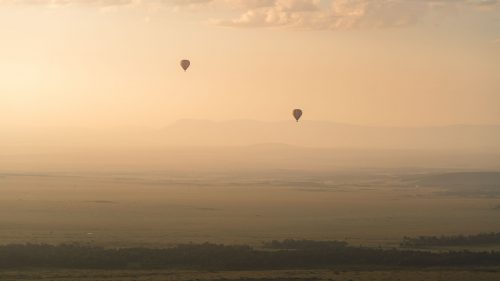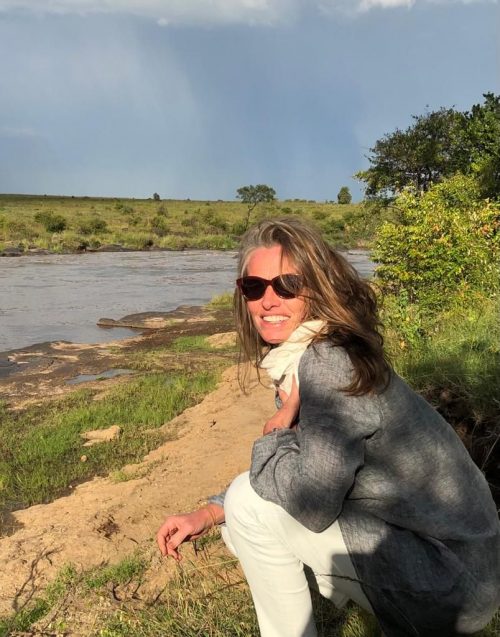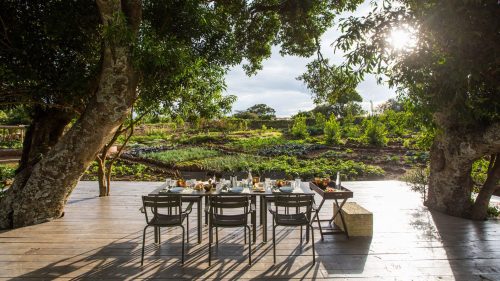
I was raised deep in rural Zimbabwe, but never allowed to forget my heritage elsewhere; the mouldy portraits of the Queen of England on our crumbling sun-brick walls, the stories of my ancestor’s early days on a coffee plantation in Kenya, our vocabulary stitched through with Swahili and Britishisms, such unsettled White settlers. Perhaps in an attempt to arrest this peripatetic tendency I made a vow to remember that I was Zimbabwean, that Zimbabwe was God’s country and that I should never leave it. I told my mother my vow — I’ve since broken it, so it no longer has the protective magic of a kept vow — and she levelled me with a look of utmost pity.
Zimbabwe was fine, she said, and at least it wasn’t England, but in her expert opinion, it was not God’s country. Her childhood home, Kenya, was actually provable, proper God’s country. And sometimes at naptime on hot, dreamy, cicada-singing afternoons, on my mother’s bed — the mosquito net tied above our heads, swaying hypnotically if I tugged on the loose threads — she’d put aside the book she was reading and tell me about Kenya with that crisp colonial accent she never lost, very careful with her vowels, vivid sketches, dramatic, without too much context, so that Kenya emerged for me the way CS Lewis’s Narnia did, a magical kingdom where people walked with lions, and grazed their cattle near herds of buffalo, and where both men and women wore red robes and strings of beads and lived within shouting distance of God.
Those stories, my childhood, all happened more than forty years ago. And I now know that the stories my mother told of her wild, wonderful life — so much of it woven through with obvious tragedy and less obvious longing — was as much panache as it was anything. You can’t always tell from the way she frames it, but she was raised in humble circumstances — a hessian-sack shack with a terrifying snake-infested choo set in the back garden — on a small chicken and dairy farm on the outskirts of Eldoret on Kenya’s western border with Uganda. 'But posh,' she always insisted. And it’s true, there’d been horses, horse racing and encounters with wildlife, and once a year the family took the train from the highlands to the coast and that was everything.
But my mother never did go on a proper safari in Kenya; it was the same with us in Zimbabwe, locals really don’t go on safaris. Camping trips were about it; usually, so the men could fish. Someone always nearly got eaten or forgotten in a petrol station. We didn’t have luxury tents, nor did we go on game drives. We could never afford it, for one thing. Once though, when I was nine after my younger sister died in a drowning accident, we threw frugality to the wind and did a self-drive safari across the country to cheer ourselves up. I remember standing in front of Victoria Falls; all that thundering power. And afterwards, in the nearby game park, we saw a black rhino and I was so moved by the experience, I cried. My family teased me the whole way back to the farm; a three-day drive in an unreliable Peugeot 304.
I grew up, married an American, and left Zimbabwe. I missed it with a physical ache, and for most of my career found ways to get back to within striking distance of it regularly; magazine assignments all over the southern cradle. I think I feared that if I lost my connection with the place, I’d lose connection with myself; my accent, my humour, my perspective. But those assignments were work, and there was always the crushing pressure to deliver a fact-checkable, timely piece at the end of it. I know I missed a lot while I was trying to not miss a thing; there was rarely a safari stitched into my stories.
My mother, meantime, held out for the grand experience. It was always her big dream that one day she’d grow the bumper crop, win the lottery, benefit from the death of an unknown rich relative and travel, travel, travel. She’d go to Paris, India, East Africa. It didn’t happen. Instead, drought, aphids, and currency fluctuation, also my father’s death, the Pandemic and two heart attacks, other stuff, worse and worse; her flame getting dimmer and dimmer. 'You’re going where?' she asked when I told her about this trip. 'How can you afford it? Who died and left you money?'
I said my dear friend Deb Calmeyer was sending me out to the Masaai Mara; plucking me out of my yurt in southeast Idaho, four years after my son’s death, my writing career stalled out, not sure of my next move. 'Deb thinks the change of scenery might do me good.' My mother won’t talk about my ongoing grief or the insanity of living in a yurt in the northern Rockies, but she knows Deb. 'Your friend who does the poshest-in-the-world safaris, a tent with an egg-shaped bathtub and your own butler?' she said. 'Oh Bobo,' she said. 'You’re so lucky.' This very thing I am doing, and that she can no longer do, this longed-for return to Kenya, a real safari on the Mara where she never went as a child but where she has longed to go her whole life.
On my last morning at Angama, before flying back to Nairobi and from there to Idaho, I wrote Mum a postcard as I promised her I would from the Mara telling her, in a nutshell, all that I could about my trip. She had said, 'Just a postcard, mind you.' She told me that my letters are so long, she’s asleep before the punchline. 'Dearest Mum,' I wrote. 'From my room on the rim above the plains, the view cannot be taken in in one go; the sky first, it swallows the imagination, the light always changing, a rolling display, just the way you described. Then, below that, the tree-dotted plains, some mornings blanketed in mist; anything might emerge, some elephants, buffalo, giraffe, zebra, all of it. I have been here four nights, and for most of that time, I’ve hardly left the deck of my room, absorbing all the being of the Mara that I can so I can bottle it in words, and send it to you. Yesterday evening though, I finally broke down and I took a drive with my guide, Moses. We stopped for snacks along the river where the wildebeest cross during the migration. On the way back, we saw a black rhino. I cried. Lots of love, Bobo.'
If I pair my presence with her longing, the stories close, the loops attach.
To be within longing; belonging.
Angama, Kenya, June 2022

Filed under: Stories From The Mara
Subscribe for Weekly Stories
Comments (0):

The Angama Shamba